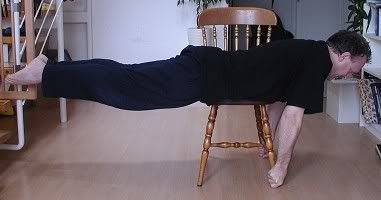(Though We Can Always Hope and Pray)The Speaker of Parliament brought the gavel down on her desk with three sharp raps. The buzz of excited conversation and frenetic motion throughout the chamber subsided just a little bit. She gave three more raps of the gavel and pleaded, "Ladies and Gentlemen. Please come to order!" The commotion eased just a few more degrees, but the Speaker smiled and barely shook her head. She understood their anticipation. It had been almost two decades since the opening session of Parliament of the little republic of Yugoromanihungavania was viewed as anything other than routine, at best, or a despicable overture to an orgy of corruption and demagoguery, at worst.
But now almost every member of this chamber, every citizen who'd waited in long queues to watch from the balcony, all the powerful figures and diplomats crowded into the VIP section, and the record number of viewers watching the otherwise unpopular Parliament channel on television knew that this session would be different. And that difference was that for the first time in almost two decades, the majority of these people felt hope that something good would be achieved. And those who did not have hope at least believed that something significant would happen. And even that, in a way, was some sort of hope.
After indulging the crowd for just a few moments longer, she stood up and hammered out a flurry of gavel raps, before she called out. "All rise! We will now be addressed by our new head of government: The Right Honorable Prime Minister Manfred Weiser!"
A roar arose which was not confined to this chamber. Heart-felt cheering filled the plaza in front of the building, in adjoining streets, and even in pubs and restaurants where people had gathered to watch this event together.
Manfred Weiser arose from his seat in the front row of benches, and slowly made his way to the podium, shaking many hands and accepting many kisses on the cheeks as he went, and the volume of the cheering remained constant throughout. Everyone, with the exception of the nationalists on the far right of the chamber and the Bolsheviks on the far left of the chamber, were on their feet applauding.
The ascent to power of Manfred Weiser had taken all parties by surprise, even his own.
He had grown up in a tiny rural village, far from the capital, the son of two factory workers. At the time of his birth, most people in his village worked for the radio factory, which turned out products whose designs where outdated by anywhere from ten to thirty years in the West, but it provided a decent living for all of it's employees. Manfred spent many a happy summer in the factory's vacation hotel in the mountains.
The Catholic priest took notice of Manfred's precociousness, and took it upon himself to supplement his education by offering him selected books of theology, philosophy, world literature, and whatever else seemed to be seed that would take in his fertile mind. Manfred and the priest spent many hours together working in the church's gardens, and talking about the things Manfred read.
But it wasn't only his intellect that had attracted the priest's attention. Manfred had an amazingly good heart, and it was his nature to be kind to everyone. But never for the sake of his own gain. That was just the way Manfred was.
He briefly flirted with the idea of becoming a priest, to emulate his mentor, but that changed when the year of his graduation from grammar school coincided with the year the Soviet Union allowed Central Europe to slip from it's iron grasp. He told the priest that he had changed his mind, and would begin working in the factory. The priest was horrified, but Manfred assured him that he would pursue a higher education in a few years' time. "It's all part of my plan," he said. That was the first time he referred to "the plan." Indeed, he rarely mentioned it to anyone, except for his closest associates. But there was a plan.
During the two years he worked at the factory, he learned everything he could about the factory, the workers, their managers, and the relationship between the factory and the surrounding villages. He was universally liked by everyone he had contact with, including his bosses.
He left the factory when he was accepted to study at the University's law faculty. After he graduated Magna Cum Laude, he got a job working under the in-house counsel of a Japanese electronics company. His boss noted that Manfred had the rare ability to communicate with everyone, win their trust, and get them to cooperate with each other. When he finally passed his bar exam, there was another synchronicity: The radio factory in his hometown, which had been struggling along for years, was going to be privatised. The in-house council did not understand at all why Manfred turned down a promotion and a salary increase, especially since the reason was so he could return to his home town.
Manfred put himself at the service of the community, and of the people who worked at the factory. All through the privatisation negotiations he represented their interests, but in a uniquely non-confrontational manner. The new owners, who planned to manufacture computer monitors in the factory, agreed to vast retraining programs, and investment in the community's environment and cultural life. Once the factory was running under new management, Manfred became legal council to the labor union.
And that's when people began encouraging him to run for parliament. This, he said, had not been in the plan. But it soon became clear to the socialist party that he was the most popular candidate anyone could nominate. He did not think it over too long. He told his friends "it wasn't in the plan at first, but it is now."
In parliament he quickly gained a reputation for integrity, honesty, and a certain kind of charisma. On the few occasions that he spoke during his first year, he did not say much, but whatever he said often had an affect on the debate. "Whatever comes out of Manfred's mouth, " said a member from the Christian Democrats, "even if you don't agree with it, you know it comes from his heart. I can't think of one occasion on which I doubted the truth and sincerity of what he said."
Slowly his standing increased, despite the fact that his colleagues thought his candidness would get him in trouble. National polls showed he was the politician people trusted the most. At the next election, the Socialists made him their candidate for Prime Minister.
It was a nasty campaign. The opposition used red-baiting, gay baiting (Why isn't a handsome young man like Manfred married?), anti-Semitism (what kind of foreign name is Weiser, anyway?), and even nastier tactics. Manfred kept a tight rein on his campaign. "Don't attack them, and always tell the truth. If anyone disagrees with this policy, I'm ready to resign. I want to win, but not at any cost."
And the more principled he remained, the more shrill his opponents looked. And the more respect and admiration he gained.
And now he had arrived at the podium, to give his first speech as Prime Minister. The applause continued, and he humbly bowed his head. The speaker pounded the gavel, and Manfred held his hands in the air to signal he was ready to speak.
"Madam speaker, members of this house, I am grateful, I am honored, and I am humbled to be called to serve our country in this way. "
Another raucous round of applause.
"But I could never emphasize enough that governing this land is only possible with the cooperation of everyone in this chamber.
"There are any number of metaphors for what a country is, any number of metaphors for the various parts that make up an integrated unit. But let us say that a country is like a human being. And the political parties are the guiding principles this human being lives by. We all live by many guiding principles, and we must constantly weigh them and balance them against each other in the way we conduct our lives day to day.
"It is the same way with a country. There is no single guiding principle which is more true than the rest. Likewise, no single political party has a monopoly on the truth. Oh! I see my colleagues in my party shaking their heads. Manfred is speaking too boldly again. He's admitting our opponents are right. How are we going to govern that way? I can answer you that. We will govern through cooperation and mutual respect.
"And what are these guiding principles represented by the parties? What truth does each of them insist that the rest of us recognize?"
He pointed at a clique of men seated at the far right of the chamber, dressed in an all-black, stylized version of the national costume. "Let us start with the nationalists. These highly -- their detractors would say hyper -- patriotic individuals are here to remind us that the nation, just like the metaphorical human being, must remain true to it's own nature. It is a travesty to forget who you really are and to pretend to be someone else. These fellows would also remind us that we should not compromise our own national interests due to outside pressure from other countries (or in our metaphor, to be bullied by other people). Can anyone here deny that this is basically true?"
He looked straight at the leader of the nationalists, who frowned, and held his arms tightly across his chest. Manfred continued, "I acknowledge that this is true. However, it does not supersede the fact that our nation is part of a family of nations. And for any family to function, its members must occasionally sacrifice for one another. But it's mutual. If you sacrifice for your brother now, he will sacrifice for you later. Indeed, we sometimes have to insist on defending our genuine interests. But it is not up to our hot heads and our egos to decided what is vital and essential to our welfare. Those are decision for our heart and for our conscience. We all benefit from being members of a strong family. And we must be tolerant and understanding of all the members of our family."
Next he turned his gaze to a larger faction -- the Christian Democrats -- seated to the left of the nationalists. "Then we have the conservatives. They are here to ensure that in our zeal to formulate the best policies we do no throw the baby out with the bathwater. Tradition is a valuable heritage of practices that have been honed and polished over generations. Situations and institutions exist in our society because they work just the way they are. And though we may debate what constitutes the best morals and ethics, we cannot argue that morals and ethics are necessary for a functioning society.
"I acknowledge that all of this is true. But at the same time, we must admit that there are times a particular way of doing things or seeing things is outmoded, and detrimental. And we also must admit that sometimes the only reason people don't want things to change is because they wish to preserve an unfair and unearned advantage they have over others. As St Paul said, "Prove all things; hold fast that which is good." He didn't say hold onto
everything. He said hold on to that which is good. And since Paul thought like a Greek, his idea of what is good, or The Good, was very lofty and spiritual, not just what was convenient and superficially pleasant. Again, the decision as to what is good is up to our heart and our conscience, and not up to our hot heads and our egos. "
And then he made a gesture with his upturned palm at a small faction to the right of the center aisle: the Entrepreneurs' Party. "Capital. Can anyone argue the central role played by capital in the contemporary world? It has been proven very convincingly that often the fastest and most efficient means of achieving a goal is to allow it to be pursued for a profit. The market is a dynamic power that can be used for the benefit of society. Capital has wrought some nearly miraculous accomplishments that all of us benefit from. And for that reason alone, the genuine interests of capital deserve to be represented in this body. But, ladies and gentlemen, let us never get our priorities askew. There are rights with higher priority than the rights of business to make profits. Occasionally lines must be drawn and business must be firmly informed that there are matters of culture, personal relationships, spiritual pursuits, family, and others that simply are not to be commercialized. There are plenty of ways to make money left in this world. Do not be greedy! And do not try to convince us that the market can solve all problems, because it cannot. You have your place among us, but know where that place is."
After a short pause, during which the Entrepreneurs shifted uneasily as Manfred watched, he turned to face just left of the center aisle, to a group of men and women in more English-styled clothing. More course wool, and waistcoats. More facial hair and wire-rimmed glasses. Some of them looked like professors or artists, and that's because they were, or had been professors and artists. He nodded and smiled to their leader, who had once remarked, " the fact that you carry leather bound volumes of Plato and Marcus Aurelius in your briefcase tells me everything I need to know about you." To which Weiser replied, "Your deductions are absolutely on the mark."
"Our friends, the liberals. Guardians of the each man's or woman's right to make up his mind for himself, and to choose one's own course of action in life. And since each person must decide the truth for himself, the liberals are the torchbearers of tolerance. But freedom to choose is not an end in itself! You must always warn your supporters that society and authority will only grant this right as long as those it entitles do their best to cultivate a high degree of discretion and responsibility when exercising it. If we waste our freedom on frivolous and immoral passtimes, we risk losing that right, and that would be a great loss. Bear that torch with all the courage you can muster! It is not only your intellectual friends who would suffer its loss, but all of us."
With a broad smile and a little chuckle, he regarded his own party, the Social Democrats. A wave of nervous laughter went through their ranks, since they knew how unpredictable Mr Weiser could be. How would he take his own party to task? "Ah, my comrades in arms! A socialist knows that society needs to be reformed, that progressive steps must be made. Imbalances must be corrected, and the less fortunate need to be compensated. Many things must be forced through for the common good.
"But what a socialist often has difficulty with is understanding that the average person thinks government is good when it leaves him and his life alone.
Furthermore, socialist must never forget the lessons of the 20th century. It is shear arrogance to assume that any person or group can "scientifically" or empirically determine all the needs of the human race and design a program to fulfill them. God and that spark of God within us, called the Soul, makes this universe and our own natures very mysterious and profound. As Hamlet said to his friend: There are more things in heaven and earth, Horatio,than are dreamt of in your philosophy."
Finally, Manfred turned all the way to his left to regard the handful of members from the radical Workers' Party. They wore very plain clothing, which each had accented with something scarlet red: a handkerchief, a tie, a shirt. One was even wearing a plain red armband, since the government had banned the public display of communist symbols several years before.
"The radicals are the embodiment of the youthful will to action. Sometimes we need to stop endlessly talking about what to do, and start doing something! A demonstration and some civil disobedience gets people's attention. It time to stop being polite and to make some people uncomfortable. Something needs to be done
now!
"But if you use radical approaches all the time, it becomes a predictable part of the background, and people stop paying attention. And, of course, there is always the danger that the methods become seen as an end in themselves. The aim is lost in the excitement of the confrontation."
Prime Minister Weiser swept his hand in front of him to indicate the entire house. "Each and every one of these ideals has its own aspect of truth. But each idea becomes of greater or lesser importance, depending on the needs of the times."
Our nation has been drifting for a long time because it has been nearly impossible to get a consensus in these chambers. But now I ask you all to deeply consider the roles you play in these debates. I hope I have convinced you that we all deserve to be in this house. And I will only be able to govern with the help of all of you. Each party, each faction, each member has only an aspect of the whole truth. I will not only listen to the advice of my ministers and the parties of my governing coalition. I will listen to every one of you, if you feel like you need to tell me something.
Together let us lead this nation wisely!"
The applause went on for minutes.
And the government program devised by Manfred's party was a success. In a way nobody had ever seen before, he convinced members of all parties to work together to formulate policies the benefited all parties.
Two years later, Manfred Weiser was assassinated while vacationing at his mountain house in the hills. It was a national tragedy which united the country. Investigations determined his assassination was organized by a bizarre collaboration between the nationalists and the Workers' Party.
Even in death, Manfred Wiser managed to inspire cooperation between otherwise hostile parties.
 The other night I was reading "The History of Tom Thumb" to my children out of Joseph Jacobs's English Fairy Tales (1890), which begins:
The other night I was reading "The History of Tom Thumb" to my children out of Joseph Jacobs's English Fairy Tales (1890), which begins:










